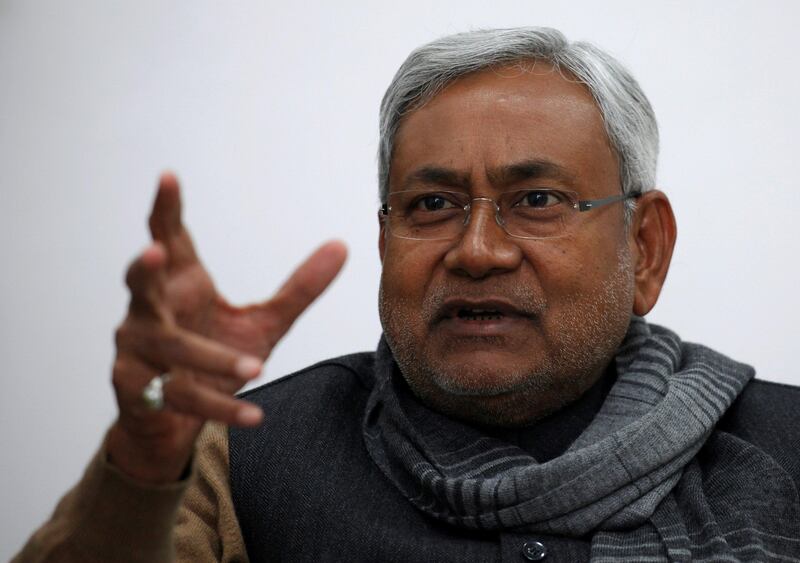Nitish Kumar resigned as chief minister of Bihar on Wednesday evening and was sworn in again by Thursday morning. In just 12 hours, Mr Kumar managed to transform the arithmetic of Indian politics.
Now in power in his state with the help of prime minister Narendra Modi’s Bharatiya Janata Party, Mr Kumar has subtracted his considerable weight from the ranks of parties that stand against the BJP – a party he opposed until now.
It is a move that will have momentous consequences in two years, when Mr Modi seeks re-election.
Mr Kumar – who began his sixth term as chief minister on Thursday – is a popular leader in Bihar. He has positioned himself as progressive and incorruptible and, while he had in the past been an ally of the BJP, he rejected Mr Modi’s brand of Hindu nationalism.
In 2013, a year before the BJP came to power at the centre, Mr Kumar lashed out against Mr Modi’s politics.
“Fascism is a threat to the country, and we will fight it,” he had said in a speech.
Two years later, campaigning in a state election, he accused the BJP of “communalising” or injecting religious frictions into the polls.
Mr Kumar won that state election, coming to power in a “Mahagatbandhan” or “Grand Alliance” – a coalition comprised of his own Janata Dal (United), the Indian National Congress (INC), and a rival party called the Rashtriya Janata Dal (RJD).
The RJD’s participation in the coalition signalled at how intent Mr Kumar was on keeping the BJP out of power. Lalu Prasad Yadav, leader of RJD, had long been Mr Kumar’s antipode in Bihar politics. Where Mr Yadav was folksy and prone to allegations of corruption, My Kumar’s reputation was of a savvy and honest leader.
Between 2015 and 2017, as the Congress’s opposition to the BJP withered in most states, Mr Kumar came to be seen as the strongest pillar of the opposition.
Just two weeks ago, in an interview with NDTV news channel, the historian Ramachandra Guha proposed that the Congress install Mr Kumar as its new president to give itself a fighting chance in forthcoming elections.
“If a friendly takeover of the Congress party is organised by Nitish Kumar, I think the opposition has a chance,” Mr Guha said. “That’s not going to happen, but, as a democrat, that would be my fantasy.”
Instead, Mr Kumar has exited the “Mahagatbandhan” and established a fresh alliance with the BJP, fracturing the opposition altogether.
The volte-face had been in the making for some time.
Mr Kumar's deputy, RJD politician Tejashwi Yadav – the son of RJD leader Lalu Prasad Yadav – was being investigated by Mr Modi’s anti-corruption authority. The RJD leader had already been barred from contesting in elections because of a previous corruption conviction. An appeal of that conviction is under way.
Also, allegations have emerged that the older Mr Yadav has made illegal earnings during his tenure as India’s railway minister between 2004 and 2009. On July 7, his house in Patna was raided by investigators, and his family members – including his politician son, Tejashwi – were interrogated.
Despite coming under pressure to step down as deputy chief minister, the younger Mr Yadav refused to resign. His persistence in the post ran against Mr Kumar’s identity as a man who ran a clean government.
Explaining his decision behind breaking ties with the RJD, Mr Kumar said that his administration had not been involved in any scandals before the allegations against the Yadavs.
“I tried to make it work as long as I could,” he told reporters on Wednesday. “My conscience told me to quit. It’s not possible to work in this environment.”
But Mr Kumar’s critics – among them politicians who had been left in the lurch by his recent turnaround – sense a hunger for power in his move.
The BJP has become stronger and stronger in state elections since Mr Modi’s win in the 2014 parliamentary poll, but it has been unable to crack into Bihar.
Mr Kumar, who hold the key to the state, is now in a position to trade it for increased influence – and possibly higher posts for himself and party colleagues – at the centre.
“In politics, you come to know what a person is thinking,” Rahul Gandhi, the Congress’s vice president, said on Thursday. “I’ve known this for three-four months … People will do anything for power and self-interest.”





